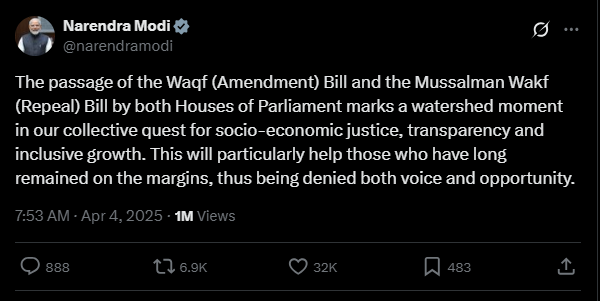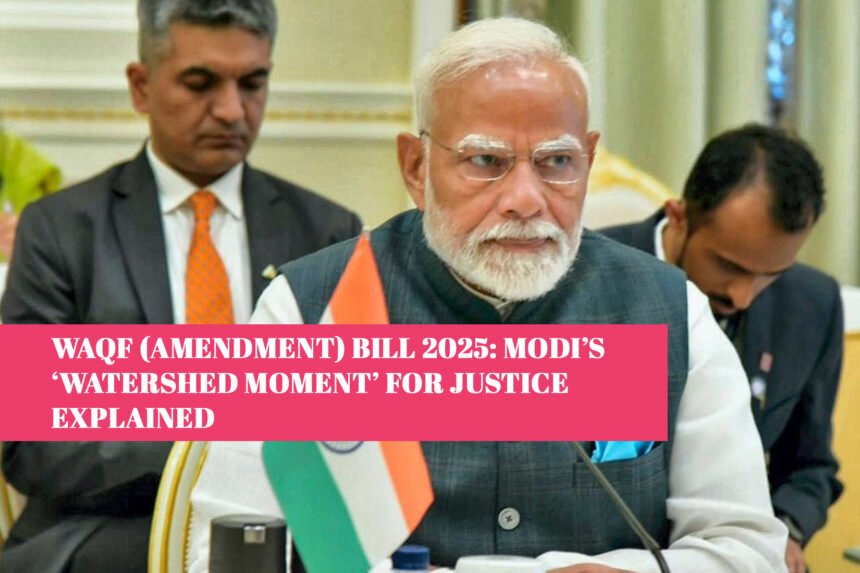On Friday, April 4, 2025, Prime Minister Narendra Modi cheered the approval of the Waqf (Amendment) Bill 2025 and the Mussalman Wakf (Repeal) Bill by India’s Parliament for Watershed Moment. He called it a “turning point” that will help India move toward fairness, openness, and growth for everyone.
How the Bills Became Law
After a long, heated discussion in the Rajya Sabha that went on for over 13 hours, the Waqf (Amendment) Bill, 2025, passed early Friday with 128 votes in favor and 95 against. Just a day before, on April 2, the Lok Sabha gave it the green light with 288 votes to 232. Now, these bills are headed to President Droupadi Murmu, who needs to sign them to make them official laws.
Modi’s Words on Social Media
PM Modi took to X (what used to be Twitter) to share his excitement. He wrote, “These bills passing is a huge step for fairness, clarity, and growth that includes everyone. It’s going to lift up people who’ve been left out and ignored for too long.” He was thrilled about how this could change things for the better.

Thanking Everyone Involved
The Prime Minister gave a shout-out to the Members of Parliament who joined in the talks and shared their ideas. He also thanked regular folks who sent suggestions to the Parliamentary committee, saying their input made the bills stronger. To him, this teamwork shows how talking things out makes democracy work.
Fixing a Broken System
Modi didn’t hold back on what he thought about the old Waqf setup. He said it was a mess for years, with no clear rules, hurting groups like Muslim women, poor Muslims, and Pasmanda Muslims. “These new laws will shine a light on things and protect people’s rights,” he explained, promising a fairer way forward.
Building a Better India
He shared a big vision: These changes kick off a new, modern system that cares about justice for all. Modi stressed that his government wants every person to feel valued. “This is how we make India stronger, kinder, and more united,” he said proudly.
What’s New in These Laws?
The Waqf (Amendment) Bill shakes things up by setting tougher rules for checking property claims and cutting back on the unchecked power Waqf boards used to have. It also makes sure women get a seat at the table on these boards, giving them a voice. The Mussalman Wakf (Repeal) Bill, meanwhile, tosses out an old 1923 law from British times, bringing everything under the updated Waqf Act of 1995 for smoother management.

MUST READ: Waqf (Amendment) Bill 2025: What It Means and Why It’s Controversial
Pushback from the Opposition
Not everyone’s on board. Opposition parties like Congress, TMC, and DMK slammed the bills, calling them “against Muslims” and “unfair under the Constitution.” They worry big companies might snatch up Muslim properties because of these changes. But Union Minister Kiren Rijiju fired back, saying these are bold moves to help minority communities thrive.
What Happens Next?
Now that both the Lok Sabha and Rajya Sabha have said yes after tons of debate, the bills just need the President’s signature to become law. Once that happens, they’re set to bring more honesty and balance to how Waqf properties are handled, tackling problems that have lingered for years.
ALSO READ: Waqf Panel Approves 14 NDA Amendments, Rejects 44 Opposition Proposals










